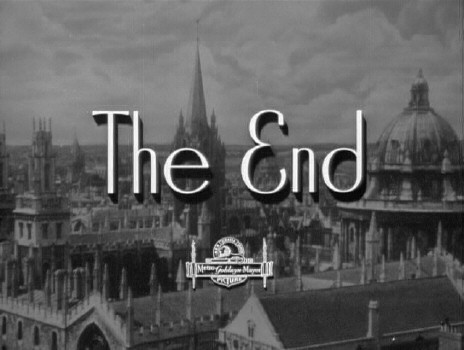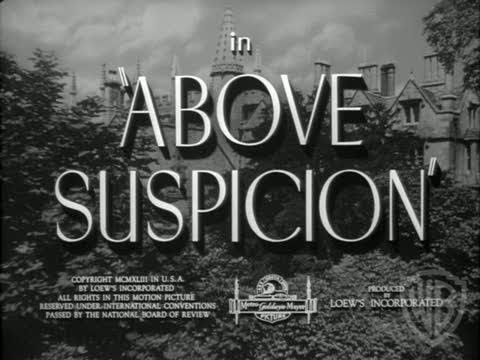
The Best of Everything
Encyclopedia Entry • Films Main
Above Suspicion
1943

Critics' Reviews • Our Reviews • Movie Posters • Lobby Cards • Misc. Images
Click here to see photos from the film.
US general release: 8/5/43.
VHS release: 11/13/91. DVD release: 4/6/10. Cast: Joan Crawford (as "Frances Myles"), Fred MacMurray, Conrad Veidt, Basil Rathbone, Reginald Owen, Cecil Cunningham, Richard Ainley, Ann Shoemaker, Sara Haden, Felix Bressart, Bruce Lestor, Johanna Hoper, Lotta Palfi, Alex Papana. Credits: Based on the 1941 novel by Helen MacInnes. Screenplay: Keith Winter, Melville Baker, and Patricia Coleman. Producer: Victor Saville. Director: Richard Thorpe. Camera: Robert Planck. Art Direction: Randall Duell. Music: Bronislau Kaper. Costumes: Irene, Gile Steele.
Plot Summary: If you believe all-American Fred MacMurray as an Oxford don, you'll probably swallow the rest of Above Suspicion. Newly married to Joan Crawford, MacMurray goes on a honeymoon in prewar Germany. Actually it's more business than pleasure: they are secret agents for the British, attempting to smuggle back information about a new superweapon being developed by the Nazis. Evil, mean, cruel and also wicked German officer Basil Rathbone imprisons and tortures Crawford (though she still looks like a million bucks), but MacMurray comes to the rescue, paving the way for a suspenseful race-to-the-border climax. The tenor of Above Suspicion can be summed up in a scene in which, after being confronted by a monolingual stormtrooper, Fred MacMurray says in English "Nuts to you, dope!," whereupon the Nazi scratches his head and wonders aloud, "Vass iss das 'dope'?" ~ Hal Erickson, All Movie Guide
Notes: This was Joan's last picture for MGM. This was also Conrad Veidt's last picture ever; he died of a heart attack on April 3, 1943, a few weeks after filming. William Powell and Myrna Loy were initially announced for the lead roles. (AFI)
|
T.S. in the New York Times August 6, 1943 Things are looking up again. At a moment when Broadway is suffering a temporary dearth of straight melodrama, "Above Suspicion" has arrived at Loew's State, and a rattling good melodrama it is, too. For here is a lovely compound of cryptic clues and unknown dangers, of dubious faces and sudden violence—a good chase film that doesn't take itself too seriously and doesn't pretend to be more than it is—a melodrama without a message. Perhaps it lacks the finesse of the Hitchcock style—and on at least one occasion borrows a trick from his "The Man Who Knew Too Much"—but this is slight exception. The fact remains that "Above Suspicion" does manage to make an hour and a half pass like twenty minutes. What more can one ask of a hectic yarn? Briefly, it recounts the misadventures of a professor and his bride, to whom is given an errand for the British Secret Service just as they are departing for a honeymoon on the Continent. Arriving in Paris, they are at once involved in a shadowy search and just as shadowy threats that follow them. The maid in the hotel is a vaguely disturbing creature, a phrase about roses brings them a guide-book with a mysterious message in code, a torn page from a Liszt concerto provides a clue to the assasin of a German bully, a collection of chessmen leads on to the ultimate goal. And after threading through a labyrinth of clues and hints a trap is sprung, and the chase comes into the open with cars roaring down the road toward the Italian frontier. It is all carried off very deftly, thanks to the cagey direction of Richard Thorpe and to a neatly constructed script. From the very beginning, the director has managed to create and to sustain the suspense of an innocent young couple entering a world where no one is to be trusted and where friend and foe are apt to act alike. Once or twice he makes the audience his confidant a little too quickly, but for the most part he keeps a sure hand on the progress of the plot. All the actors do well. Fred MacMurray carries off his role with the quiet ease of a long-experienced actor, and Joan Crawford, after a couple of pretentious roles, is a very convincing heroine. The late Conrad Veidt must have enjoyed this sabbatical from his portraits of thin-lipped villainy; here he plays a sort of underground Robin Hood who bobs up in various guises just when the professor needs him most. Basil Rathbone, Reginald Owen, Johanna Hofer and others do admirably in lesser roles. Among them, they have made a sound and completely entertaining thriller.
Howard Barnes in the New York Herald Tribune (1943): There are so many spies in Above Suspicion that it is hard to keep track of them. There are so many floral, musical, and cryptographical passwords in the film's plot that the whole show becomes a sort of super treasure hunt....Unfortunately, neither Joan Crawford nor Fred MacMurray look quite bright enough to unravel the tangled skeins of this screen melodrama.
|
If you've seen Above Suspicion and would like to share your review here, please e-mail me. Include a picture or avatar of yourself to accompany your review, as well as a star-rating (with 5 stars the best) and any of your favorite lines from the film.
|
Rating:
Above Suspicion (1943) is notable for three reasons: First, it is Joan's final film during her 18-year tenure at MGM. Second, it marks the only time Joan co-starred with Fred MacMurray. Third, AS is the final film of Conrad Veidt.
As with Joan's previous film, Reunion in France, this is an OK movie that suffers when compared to its peers. With the world mired in World War II, studios were churning out war-related films. AS is no classic like Casablanca, The Best Years of Our Lives, Mrs. Miniver, etc. The latter among these most have been a particular blow to Joan, as MGM gave the lead role to relative newcomer, Greer Garson.
There is intrigue and suspense in AS, but much of that is lost amidst an overly tangled plot. Crawford and MacMurray traipse all over Europe on their honeymoon, hunting down clues and running into a wide array of people. We do not know if these people are friend or foe, and after about 45 minutes, I didn't care much.
Joan's co-star, Fred MacMurray, was at this point mostly known for light comedy work with actresses like Carol Lombard. AS was made before his evil turn in Double Indemnity (1944) and long before cementing his good-guy image in perpetuity as the world's greatest dad in the long-running ('60 to '72) TV series, My Three Sons. MacMurray is good here, but like John Wayne in Reunion in France, this is not a role that comes to mind when thinking of his career.
AS has the distinction of being Conrad Veidt's last movie and also the one right after his most iconic role: Major Strasser in Casablanca (1942). (Veidt was also excellent as Joan's co-star in 1941's A Woman's Face. In Above Suspicion, as with AWF, and indeed every film of his that I have seen, he is very good.)
(A biographical side-note: There is poetic justice that Veidt---an ardent anti-Nazi---got to go out playing a sympathetic character as opposed to the baddies he was often typecast as. Veidt was a top star in Germany as far back as the 1920 silent classic, The Cabinet of Dr. Caligari. Veidt was not Jewish, but his wife was. In 1933, when Hitler took power, Veidt emigrated first to England, and then later to Hollywood, doing what he could to stand up for his principles and shine a light on Nazi misdeeds.)
On the bright side of AS: Many of the folks Joan and Fred run into on their adventures are played by veteran character actors, who are enjoyable to watch. Among these, I particularly enjoyed Reginald Owen, Richard Ainley, and Bruce Lester.
Richard Thorpe is the director. All I know about him is that he was fired after a couple of weeks at the helm of The Wizard of Oz. Above Suspicion would have profited from a similar canning, a pared-down story line, and someone like Alfred Hitchcock to direct.
Rating:
Above Suspicion is a wake-up call for those who believe that a name star---such as Joan Crawford---can carry an utterly dull film if she's only allowed to be as dull as her surroundings. In later years, Joan would rise above drek through sheer force of onscreen personality, but at this point---as she was about to quit/be kicked out of MGM and before she signed with Warner's---she was utterly powerless and nowhere near able to sway the direction of a very tepid film.
In Above Suspicion, Joan is "Frances Myles," an American Oxford student newly wed to American Oxford professor Richard Myles (Fred MacMurray). (The film unnecessarily gives us info that Frances was once a Boston debutante, I suppose just to explain a very brief, unnecessary scene with two doddering Boston aunts that the couple runs into. Another oddity: Joan is nearly 40 in this film; I highly doubt that Oxford accepted 40-year-olds, especially women, into any undergrad program during this time period.)
It's 1939, with Hitler on the warpath, and once Frances and Richard depart for their honeymoon on the Continent, the British Foreign Office immediately instructs that Richard be stopped in Dover so that he can be given an assignment to contact several British agents in Germany, with the ultimate goal of receiving plans for a secret German weapon of war. Frances and Richard are chosen because they're "typical tourists" and thus "above suspicion."
What follows is a hodge-podge string of not-particularly-clever meetings-up with secret agents in cafes, in bookstores, in hotels, in museums, in chess shops, at concerts, et al. All of which scenes are also extremely poorly written character-wise, so we ultimately don't care what happens to any of either the good or bad guys. Who cares if Conrad Veidt (very underutilized in the very last picture he made before his death) initially seems suspicious or Basil Rathbone initially seems trustworthy? Who cares about the Liszt-loving possible assassin Bruce Lester? We, the viewers, have thus far seen all of these characters in only the most broad, shallow of terms. Same with the guy tied up in the castle---who cares?
I blame the utterly pedestrian director Richard Thorpe for most of this, along with the equally pedestrian screenwriters (Winter, Baker, Coleman). MacMurray was usually bland anyway, so no harm to him, but I do feel badly for Joan that she had to end her MGM career this way. Though she is given one funny line while watching strenuously marching Nazis (echoing the warnings once given to her own '20s flapper generation in an entirely different context): If they don't take it easy, they'll be burnt out before they're 21!
Rating:
End-of-an-era time. Or, rather, a case of over-and-out? For
Joan Crawford herself in 1943, she may very well have been feeling a
mixture of both emotions. After 18 successful years with MGM, Miss
Crawford could not help but notice that maybe the writing
was on the wall in regards to her future with the "Studio of the
Stars." Garbo was gone. So was long-term rival Norma Shearer. And yet, Miss
Crawford was (wrongfully in my opinion) still having to play second
fiddle to newer starlets, most noticeably British
newcomer and former co-star (1941's When Ladies Meet), Greer Garson. MGM's refusal to allow their
by-this-point longest-standing actress the lead rule in Madame Curie
(a role that Miss Crawford desperately wanted) in favour of Garson would
prove to be the final nail in the MGM/Crawford
coffin.
So, there would be no Madame Curie for Joan Crawford. Instead, her MGM swan song was Above Suspicion, her second WWII-related picture in a year. At least, however, unlike Reunion In France, Miss Crawford didn't have to adopt a French accent and does have decent chemistry with leading man Fred MacMurray. The supporting cast are quite strong, too, despite some very stereotypical personas. Joan was also at the peak of her beauty (in my opinion here) and more than usual you cannot keep your eyes off her. Those are the good points. Now the bad. Joan's role of Frances Myles is perhaps one of her blandest characters during all of her MGM period. There's nothing really exciting or engaging about her. She's just sort of there. And toward the very end of the picture, she seems to almost be lost in action, playing second fiddle to her husband. Miss Crawford, as per usual, did the very best with what she was given, but a star and an excellent actress of her calibre deserved better. The plot of Above Suspicion is also quite hard to to follow, and I actually lost track of what was meant to be occurring at several points. Not a good recommendation for 90 or so minutes of movie viewing. All in all, Above Suspicion, whilst NOT an awful film, suffers, like Joan's character, from being just "sort of there." After almost two decades as an MGM star, Joan Crawford deserved more than such lackadaisical content. It was truly time to move on. Thankfully, Warner Bros, a certain heroine by the name of Mildred Pierce, and an awful daughter called Veda all lay in her near future...
Rating:
For some reason Miss Crawford’s last outing with MGM is enjoyable to me. The film has a mood that carries it, and us, through and also lets us see Miss Crawford in somewhat of a different role. She is light and comfortable; some may think she is dull, but she plays with an ease that is not always noticeable in other films. This could be attributed to her co-star Fred MacMurray (his last Boy Scout role before Double Indemnity), because it is not the script or the direction. I have not read the novel by Helen MacInnes; therefore I can only say the screenplay is implausible at times. It has moments where it lags and then sags: The thrills are gone, there is no suspicion (just a bunch of actors giving everyone the eye), and it rises above nothing. The studio had to make it. Still, director Richard Thorpe does attempt to keep the mood consistent. But it is not enough to bring this film to a higher level; with the right treatment, it could have been an "A" war-time thriller. Miss Crawford and Mr. MacMurray are actually a fun combination and seem well poised with each other; they share a married couple’s wit that keeps some interest going and covers up for some of the weaker/laughable moments the script makes them go through. Miss Crawford is again lucky with a fantastic supporting cast and technical crew (Irene fills in for Adrian and Joan looks swell). MGM is generous while their supplies last! Devilishly wonderful Conrad Veidt (A Woman’sFace, Casablanca), playing a nice guy and, unfortunately, playing his last role in pictures or anywhere, died of a heart attack soon after filming completed. He lets Basil Rathbone be the nasty guy this time. Mr. Rathbone is sinister throughout, and I wish he had tied Miss Crawford up instead of the old guy. Reginald Owen is on hand with Miss Crawford for the last time, for old time’s sake. Felix Bressart (Ninotchka) got away from comedy to play a sneaky bookstore owner/spy. Cecil Cunningham, second runner-up to Edna Mae Oliver’s “horse face,” has a meaningless role as Basil Rathbone’s aunt. Her gravel-voice and remarks about Nazis add a delightfully classic touch to the proceedings. You must see her in The Awful Truth with Irene Dunne and Cary Grant. The “killer,” played by Bruce Lester, is a little-known actor (he has a nice role in The Letter), and here he is given the chance to portray a man seeking his revenge on the Nazis. (The murder scene was used once before by Alfred Hitchcock; here it seems hijacked and of no use.) For about 8 seconds we get to see Ann Shoemaker and Sara Haden as Joan’s aunts. They should have been pulled back into the story somehow and met everyone for pizza at the ending, but I doubt that would have helped much. And that is how they leave us -- going to eat some pizza? Good-bye MGM. Hello Warner Brothers!!
Ed Guinea (February 2009) Rating:
This is an above-average 1943 MGM thriller starring Joan Crawford, Fred MacMurray, Conrad Veidt, Basil Rathbone and Reginald Owen. I give this film 4 stars! This film was made during Joan's last years at Metro and is considered by most critics to be weak, and a minor addition to the Crawford portfolio. Looking at it from a Joan perspective and 65 years later, I disagree strongly. It is an apt departure for Joan, along with Reunion In France. Above Suspicion is a spy thriller based on the novel by well-known best-selling spy novelist Helen MacInnes. The film is directed by veteran action director Richard Thorpe. The supporting cast is composed of a a well-rounded cadre of character actors from the MGM stable of players. They are all recognizable and wonderful. The movie was released during WWII as a propaganda piece in Hollywood's means to assist the war effort. Joan and Fred give it their all as newlyweds on their honeymoon in Austria, of all places! It is delightful to view Crawford well before her "mean" or "hard" period toward the end of her career. She's happy, carefree, and downright comical as she follows every narrow step hubby MacMurray stumbles over in his quest to seek out certain "secret" members of The Resistance, while meeting with other spies along the way (such as Owen) who feed him information and direction. What a place for a honeymoon! The story is a bit far-fetched, with MacMurray playing a spy for the British Foreign Office while Joan is clueless about it through the first half of the film. When she finds out, she decides to join in the chase and has a ball! There is genuine suspense throughout, with the supporting cast delivering a knock-out punch. Worth watching!
|



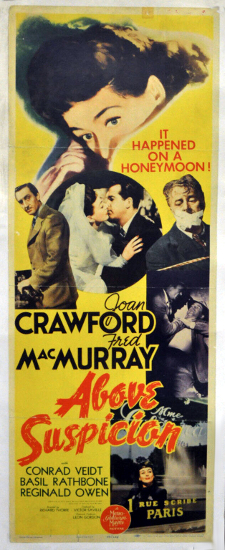
Above left: Australia. Above 3 at right: US. Below: US.

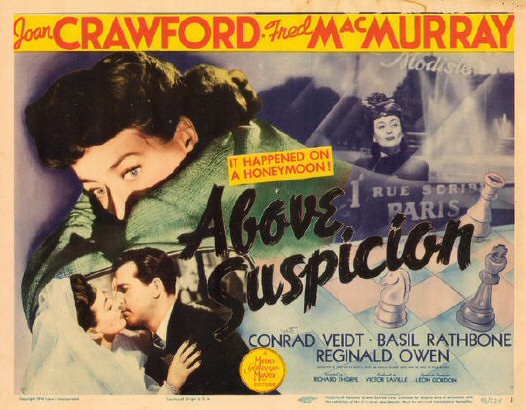
Below: US lobby cards.
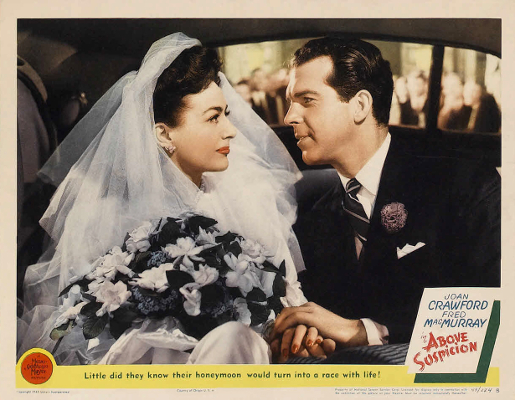



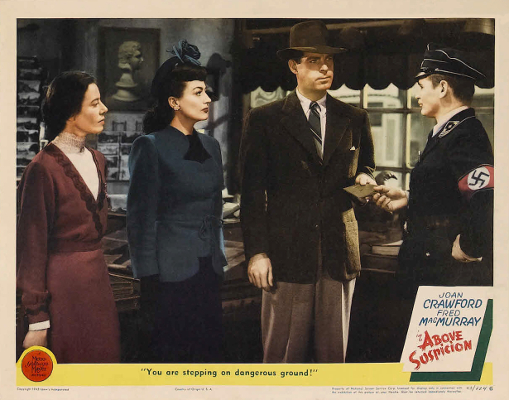
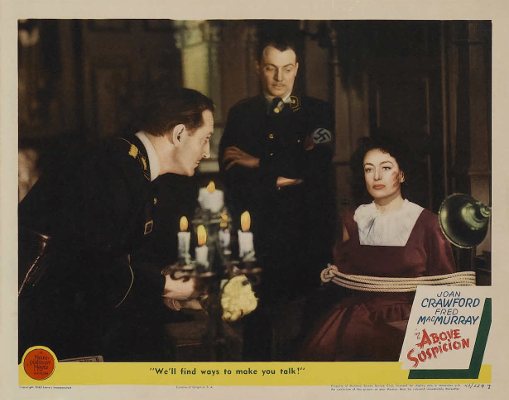

Below: Mexican lobby.

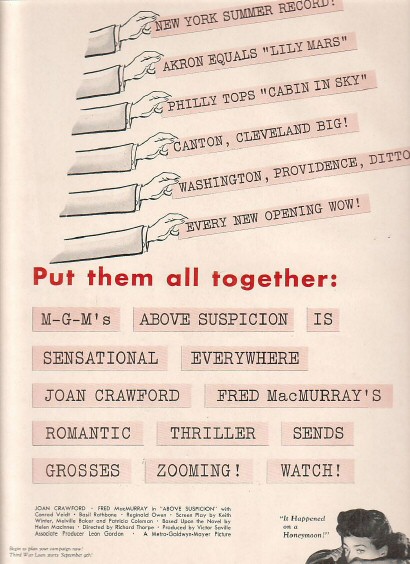
Above: US trade ad.

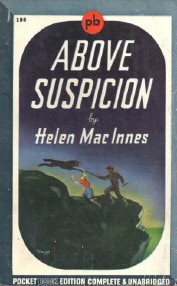
See the Books page for more info.
The Best of Everything
